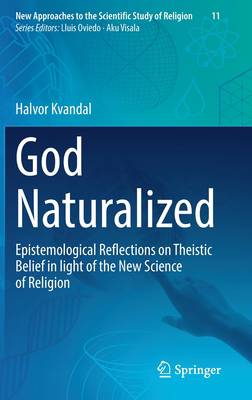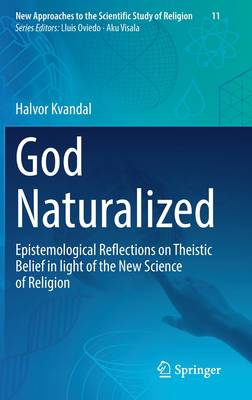
- Afhalen na 1 uur in een winkel met voorraad
- Gratis thuislevering in België vanaf € 30
- Ruim aanbod met 7 miljoen producten
- Afhalen na 1 uur in een winkel met voorraad
- Gratis thuislevering in België vanaf € 30
- Ruim aanbod met 7 miljoen producten
God Naturalized
Epistemological Reflections on Theistic Belief in Light of the New Science of Religion
Halvor KvandalOmschrijving
This volume argues that theistic philosophy should be seen not as an "armchair" enterprise but rather as a critical endeavor to bring philosophy of religion into close contact with emerging sciences of religion. This text engages with the rationality of religious belief by investigating central problems and arguments in philosophy of religion from the perspective of new naturalistic research. A central question the book analyzes is whether findings in cognitive science of religion (CSR) falsify or undermine religious ideas and beliefs.
With regard to CSR, this volume offers a sustained and critical investigation of the neutrality and positive-relevance view, before offering a re-appraisal of the conflict view. The text argues that when scrutinizing these views, much more attention must be paid to specific normative premises that allow empirical findings to have epistemic relevance. A novel feature is the theoretical application of analytical epistemology in virtue-epistemology to the central question of whether CSR undermines, supports, or is neutral with respect to religious belief. This book appeals to upper-level students and researchers in the field.
Specificaties
Betrokkenen
- Auteur(s):
- Uitgeverij:
Inhoud
- Aantal bladzijden:
- 204
- Taal:
- Engels
- Reeks:
- Reeksnummer:
- nr. 11
Eigenschappen
- Productcode (EAN):
- 9783030831776
- Verschijningsdatum:
- 28/10/2021
- Uitvoering:
- Hardcover
- Formaat:
- Genaaid
- Afmetingen:
- 156 mm x 234 mm
- Gewicht:
- 476 g

Alleen bij Standaard Boekhandel
Beoordelingen
We publiceren alleen reviews die voldoen aan de voorwaarden voor reviews. Bekijk onze voorwaarden voor reviews.











